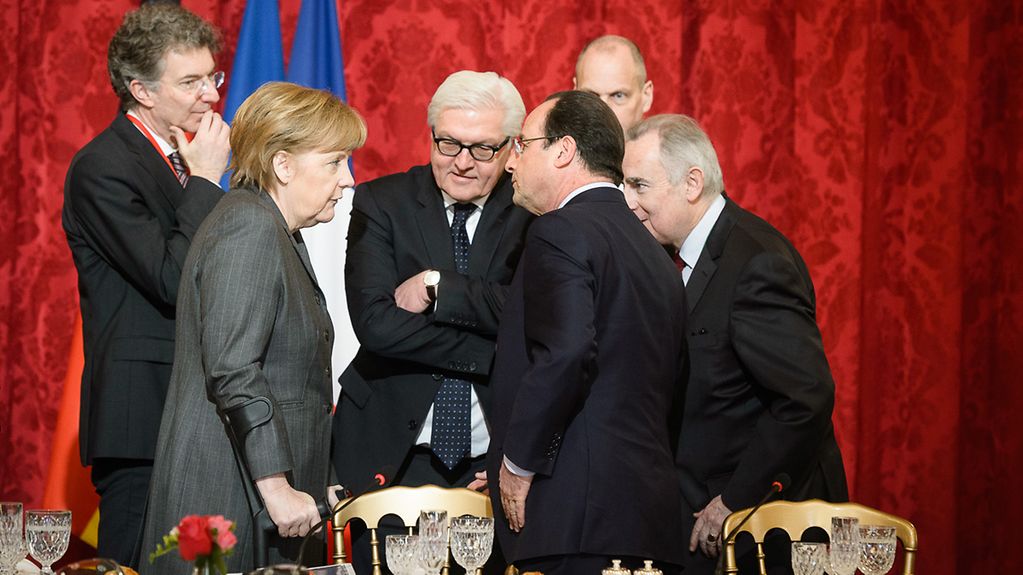Franco-German Council of Ministers
At the 16th Franco-German Council of Ministers in Paris, Federal Chancellor Angela Merkel and French President François Hollande agreed to pursue a number of joint economic, energetic and defence-related projects. However, the escalation of violence in the Ukraine dominated the agenda.

Federal Chancellor Merkel and Federal Foreign Minister Steinmeier discussing with President Hollande
Photo: Bundesregierung/Steins
During the final press conference, Merkel and Hollande expressed their dismay at the outbreak of violence on Independence Square (Maidan) in Kyiv. They condemned the brutality of the clashes that have made many victims since Tuesday on the side of the government security forces as well as on the side of the demonstrators.
Sanctions against Ukraine discussed at special EU meeting
Merkel stressed that the "shocking images" made her feel for "all the victims of violence" in Kyiv and elsewhere in the Ukraine. Now everything must be done "in order to reopen a political dialogue". Germany and France, just as the EU as a whole, are ready to "talk with everyone", including the President "if he is open to such talks".
At the extraordinary meeting of the EU's foreign ministers on Thursday it will be discussed "what specific sanctions might be imposed if necessary", the Chancellor said.
Strengthening the common economic policy
The strengthening of the economic and monetary union was also on the agenda of the bilateral talks. Germany and France are committed to the deepening and the viability of the European Union, the Chancellor stressed.
A strong economic union is an important part of a well-functioning monetary union. Merkel made it clear that the partners were looking for "cooperations making this harmonisation possible also on the economic policy level". Merkel and Hollande expressed appreciation for everything being done in this area by their finance ministers.
The Chancellor cited as examples the work in the field of fiscal law and on the development of a tax on financial transactions. She thanked the finance ministers for their efforts aiming at submitting a proposal before the elections to the European Parliament in May. A first step in this direction would send an important message to voters: "Financial actors also have a responsibility to bear" in the social market economy model.
Working together to further develop the energy sector
Mastering the shift to green energy is "a very pressing problem for Germany", Merkel said. Common opportunities with France must be seized in this field. Merkel thus welcomed the establishment of a joint platform and the planned cooperation between the two countries' energy agencies. The cooperation between capacity markets is another new avenue to be further developed. Here, both countries could act as "pioneers" in the transition to renewable energies in Europe.
Germany and France will present their positions on the question of economic efficiency together before the EU Commission. The objective, Merkel explained, is to allow the industrial production sector to grow again. However, this also requires conditions allowing energy intensive industries to be able to compete with US-based industries, for example.
Military cooperation in Africa
The preparation of the EU-Africa Summit in April is another common concern. It will be, according to Merkel, "a great chance to emphasize the global approach of a policy on Africa". Germany and France could provide an impulse here.
Merkel stressed the symbolic value of the planned deployment of the Franco-German Brigade in Mali as part of the EUTM: In this year of the hundredth anniversary of the outbreak of the First World War, it is clear that Germany and France have "other problems to deal with" today. It is also clear that these global problems can be solved through cooperation, she added.
The Chancellor thanked the French president "most sincerely" for his invitation to Normandy in connection with the commemorative year 2014. A ceremony will take place there to commemorate the Allied invasion of Nazi Germany ("D-Day") in June 1944. Looking back on the foundation of the European Union, one can only observe that "it is our good fortune that we are united, and we, the governments of Germany and France, want to act out of this good fortune".
There have been institutionalised summits between Germany and France for more than fifty years. They were introduced by the Elysée Treaty, which was signed on 22 January 1963 by Federal Chancellor Konrad Adenauer and President Charles de Gaulle. Until 2003, eighty of these meetings between the heads of government of both countries took place at different locations. Since then, at least one Council of Ministers – that is a meeting of the ministerial cabinets of both governments – is organised each year.






